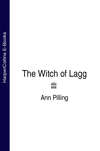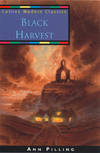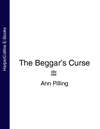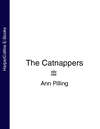Loe raamatut: «The Witch of Lagg»


DEDICATION
For my father and Julie, with love,
and with profound thanks to Professor Richard Tilleard-Cole
CONTENTS
COVER
TITLE PAGE
DEDICATION
CHAPTER ONE
CHAPTER TWO
CHAPTER THREE
CHAPTER FOUR
CHAPTER FIVE
CHAPTER SIX
CHAPTER SEVEN
CHAPTER EIGHT
CHAPTER NINE
CHAPTER TEN
CHAPTER ELEVEN
CHAPTER TWELVE
CHAPTER THIRTEEN
CHAPTER FOURTEEN
CHAPTER FIFTEEN
CHAPTER SIXTEEN
CHAPTER SEVENTEEN
CHAPTER EIGHTEEN
CHAPTER NINETEEN
CHAPTER TWENTY
CHAPTER TWENTY-ONE
CHAPTER TWENTY-TWO
AFTERWORD
KEEP READING
COPYRIGHT
ABOUT THE PUBLISHER
CHAPTER ONE
“My back’s killing me,” Colin grumbled, trying to get the rickety wheelbarrow back on to the path again, “and this barrow’s falling to pieces. Can’t Mr Grierson get you a new one? How can he expect you to manage with a thing like this?”
Duncan Ross shrugged, and his brown freckled face darkened slightly. It always did when anyone mentioned Hugo Grierson of Lagg Castle. He was a great landowner, one of the wealthiest men in this part of Scotland, and one of the meanest, according to Duncan’s father Angus, who worked for him.
“Och, A’ve tel’t ye already,” the boy said, “he’s awfu’ tight wi’ money. He’d like fine to have us awa’ from here. Have ye no’ seen our hoos?”
They certainly had. Ramshaws was a crumbling stone hut high in the trees above Carlin’s Crag, the great white rock face that gashed this dark green woodland like a huge hunk of bone. The Ross’s cottage had walls that ran with damp, no electricity, and rotting window frames.
Colin wanted to climb the Crag but it was highly dangerous, and all fenced off with barbed wire. The views from up there must be fabulous, with the dark green pine forests spreading down to the sea, and a glimpse across to the English Lake District on a clear day. Lagg Castle, where he was staying for the summer with his sister Prill and their cousin Oliver, was just inland from the coast, overlooking the Solway Firth. They were only fifty miles across the English border, here in the Scottish Lowlands, but it felt like another world.
Today they were too deep in the woods for any kind of view, helping Duncan to dismantle a huge pile of stones in the garden of an empty cottage called Lochashiel. The stones were needed to repair a wall that had collapsed in one of Hugo Grierson’s fields, and the three children had been sent out to give Duncan a hand. The stones were so heavy, and the children had had to make so many journeys with them, that the ancient barrow really did look as if it was ready to fall apart.
“It’s pretty here,” Prill said, looking across the tangled garden at the small white-washed cottage. “Why doesn’t he let you live in this? You’d only need to tidy up a bit, and give it a lick of paint – and it’s much nearer the road. You wouldn’t have that awful long track to climb, if you lived here.”
“Aye,” muttered Duncan, looking even gloomier. “That’s true. But he wants to make money out of the place. Ma faither was born in this hoos, and it’s ours, by rights, but Grierson says he’s keepin’ it for holiday folk.”
“But there’s nobody in it,” Oliver pointed out. “The furniture’s all covered with dust sheets. I’ve looked.”
“You would,” Colin said irritably. “Why don’t you give us a hand with this lot, instead of snooping about, peeping through windows? Some holiday this is going to be. Honestly, I’ve had just about enough!” He sat down grumpily in the middle of the mossy forest path, abandoning the wheelbarrow and its load.
“Let’s have something to eat,” Prill suggested, trying to be tactful. She knew Colin was spoiling for a fight with Oliver. “There are some buns in this bag, and a bottle of lemonade.”
“Home-made,” Oliver said proudly.
Colin would have preferred Coke to the sour, gritty concoction provided by Oliver’s mother, his Great Aunt Phyllis, but she said fizzy drinks rotted your teeth and kept you awake at night. Everything was going to be home-made for the next few weeks because she was in charge of all the cooking.
Lochashiel was on the lower fringes of a vast plantation, which belonged to Hugo Grierson. David Blakeman, Colin and Prill’s father, had come up to Scotland to paint the master of Lagg. He was an art teacher at a big comprehensive school but he sometimes got commissions for portraits. Not enough to give up teaching, though, which was what he really wanted to do.
His wife had stayed behind to look after Grandma Blakeman. She’d just recovered from very bad influenza and the doctor said she shouldn’t really be left. She’d actually caught it from Mrs Blakeman, and neither of them were feeling too fit. “It’s a case of one old crock looking after another,” their mother had laughed, pale-faced but cheerful, waving them off a few days before. Dad had been keen to do this Scottish portrait but when his wife fell ill, and Mr Grierson phoned to say his housekeeper had just given in her notice and left, he thought the whole plan would have to be scrapped. The children couldn’t run round the place unsupervised, the man had made that quite clear. Then Great Aunt Phyllis came to the rescue.
She was Grandma’s younger sister and Oliver was her adopted son. They lived with miserable Uncle Stanley in a London flat at the top of 9, Thames Terrace, a forlorn-looking house near the river where she looked after six elderly people and where Oliver had to creep round in soft shoes, and whisper all the time, in case he annoyed the old folk.
They’d all gone away for the summer, while repairs were being done to the house, but Uncle Stanley had refused to budge. He didn’t trust those workmen, they might steal his books, or interfere with his collections.
Aunt Phyllis was all for getting Oliver out of London, away to the country, and when Dad told her that the holiday was off because Hugo Grierson had just lost his housekeeper she immediately offered to help Mum could stay behind with Grandma, and get her strength up again, and she would cope with the family, Oliver, his two older cousins, and their little sister Alison who was just walking. The toddler had her moments but she was no match for her Aunt Phyllis. After years of handling difficult old people, and years before that as a hospital matron, she reckoned she could manage Alison blindfold, with one hand tied behind her back.
Rather to Dad’s surprise, Mr Grierson had agreed instantly, over the phone. His main concern was to have peace and quiet for the painting sessions, and not to be disturbed by a troop of noisy children. Aunt Phyllis sounded ideal.
“It’s all worked out beautifully,” she’d announced, patting her new steel-grey perm when they eventually met up at Dumfries Station, but one look at Oliver and the Blakemans’ spirits sank. He’d muscled in on their family holiday yet again, and this time all his pernickety, nit-picking habits would be reinforced by his mother.
Anyway, if either of them upset Alison it was going to be all-out war. They’d agreed that on the train.
“She’s not going to be bossed round by those two,” Prill had said fiercely. “She’s only little, and they’ll just have to make allowances. Aunt Phyllis is always so mad keen to get people organized. Ugh!”
It was their aunt who’d roped them in for this rock-shifting exercise. She firmly believed that “the devil made work for idle hands to do” and when she’d discovered that Duncan was expected to do the job all on his own she’d immediately dispatched the children up to Lochashiel.
“Go and give the poor boy a bit of help,” she’d ordered, immediately after breakfast. “Get some fresh air in those lungs. Four pairs of hands are better than one. Lunch at twelve-thirty sharp. I’ll cope with Alison.”
Oliver hadn’t wanted to touch those stones at all. The first couple of days with his cousins were always difficult anyway, because he irritated Colin, who made no secret of the fact, but the minute he saw the huge heap, piled up like a cairn on the top of a mountain, in the middle of that cottage garden, he knew that there was something special about it, and that it shouldn’t be tampered with.
He’d said nothing, realizing they’d probably laugh at him, or say he’d got a bee in his bonnet, as usual. Instead, he’d hung about by the little garden gate as the other three inspected the mysterious rocky mound, with cold shivers running up and down his back, silently willing them to leave the thing alone. When they started to load the barrow he came forward very reluctantly, but he didn’t offer to help. Prill and Colin knew he wasn’t strong, and he was ill quite a lot. He’d trade on that if the Scots boy tried to get him working.
He stood watching nervously while the others removed the first few layers of stones and chucked them into the barrow. When two loads had been wheeled down to the field, and they were doing a third, Oliver peered forward and suddenly put a hand on the greenish mossy stones that were now coming to light. They were damp.
“I bet it’s a well,” he said quietly, a strange excitement creeping into his voice. He jabbed at the boulders with a stick. “Look, you can see now. It’s definitely circular, and these stones have sunk in a bit. I bet that’s what it is.”
Duncan glanced across at Oliver as he took a swig from the lemonade bottle. This boy puzzled him. A queer staring look had come into his eyes when he saw the cairn, his thin little body had gone all rigid for a minute and he had obviously been very reluctant to join in. The Scots boy wasn’t too impressed. It was a hard job they were doing, and he needed all the help he could get. The girl hadn’t been able to do very much, because most of the stones were just too heavy for her to lift, but this boy could have surely had a go. His first attempt had sent him staggering backwards and his second had grazed his knuckles. He’d then spent a full five minutes complaining, and inspecting his injuries, and after that he’d not helped at all; instead he’d fiddled round by the well, poking round with a penknife and putting bits of rubbish in his pockets. He just didn’t like hard work. Oliver didn’t exactly resemble Superman. He was thin and bony, and short for his age, and he wore thick black glasses that gave him an owlish look.
“I reckon it’ll take maybe another twa loads to finish this job,” Duncan grunted, casting a scowl at Oliver as he helped Colin back on to the track with the barrow. “Aye, an’ yon laddie’s neither use nor ornament the noo.”
“No,” Colin muttered in embarrassment. “It’s a bit typical I’m afraid. He’s a skiver. I’d like to tell him exactly what I think of him but it’s rather difficult with his mother always breathing down our necks.”
He could have said a lot more about his cousin but he decided to keep quiet. They’d been on holiday together before and Oliver got weird ideas about all sorts of things. Events had often proved him right, but somehow Colin didn’t want to embark on all that, not with this straightforward Scots boy. He’d certainly noticed Oliver’s odd reaction to the cairn of stones, his bulging eyes, his shaking; he might tackle him about it later, when they were on their own. He knew his cousin wouldn’t say anything himself, he was too secretive.
They were tireder than they knew after all the fetching and carrying. Colin could hardly push the barrow along the path, though it was downhill all the way to the field.
“Is it stuck?” said Prill, tugging at the rough wooden handles. “Let’s all pull together. One, two, three … there you are. You’re off.” And Colin staggered away into the trees with his creaking load.
He was halfway down the track when something odd happened. At first he thought it was that idiot Oliver playing tricks on him. He was pushing his barrow along, quite enjoying the smell of the pine needles, and the stillness of the deep woods, when someone suddenly jumped on to his back.
“Hey!” he shouted, dropping the handles, “What on earth …” It was the kind of thing Alison did sometimes. She’d get up on to a stool or table, leap on his shoulders and beg for a piggy-back ride. Cold little fingers were clutching at his neck now, and there was a funny whistling noise in his ears. He spun round, but the weight on his back made him lurch about and he fell sprawling into the bracken. The barrow tipped over and its load went crashing on to the path. One of the biggest stones hit Colin’s foot, right on the instep where there was hardly any flesh. It was terribly painful, even through his sneakers.
“Ouch!” he yelled, hopping about, and rubbing. But someone was actually laughing at him, a thin, high-pitched laugh that seemed to set the nearest bushes rustling. A spiteful kind of cackle that sent cold shivers through him.
His foot was so painful that he felt quite sick. He sat down, closed his eyes, and dropped his head down between his knees. When he looked up again Duncan was peering down at him anxiously. He had two massive boulders, one under each arm, and he was sweating.
“What’s come ower ye, man?” he asked.
“I … I …” Colin began feebly, but words failed him. There was nobody else on the path at all, and the other two were still up at Lochashiel. Yet it had to be Oliver who’d pounced on him like that. Who else could it have been?
“What’s wrang wi’ ye?” repeated Duncan, looking at him curiously, then at the overturned barrow, and the litter of stones.
“Someone jumped out at me,” Colin said, still rubbing his foot, “and they must have run off into the woods. I – heard them laughing.” He got to his feet again, but he swayed slightly. The weight didn’t seem to have gone away somehow. He must have ricked his back, humping all those stones about.
“Sit you doon, man,” ordered Duncan. “Ye look like ye’ve seen a wee ghaist. I’ll put the stanes back; you bide where y’are a wee while.”
Colin watched him reload the barrow. He puffed and sweated as if each stone weighed a ton. It was as if they’d doubled in size on their way down from Lochashiel, and he kept dropping them. It was the slimy ones from the bottom, presumably, that would keep slipping through his fingers.
He’d only just finished when Prill and Oliver came out of the trees. The skinny young boy was carefully cleaning the blades of his penknife but Prill was looking into the woods. She kept turning her head from side to side, and sniffing.
“I’m right you know, Oll. Someone has been along here. You should tell your father, Duncan. Mr Grierson’s got intruders.”
“What? Here in the wood? That’ll be holiday folk from yon tents in the long field.” He shrugged. “Ye canna do ower much aboot that. It’s no’ agin the law to trespass here in Scotland, unless harm’s done.”
“But they have,” said Prill. “They’ve been lighting fires. Can’t you smell anything?”
Duncan sniffed. Someone had certainly been burning something, and close at hand. It was a warm day with no wind, yet you could smell smoke drifting over from somewhere.
“It’s like this all along the path,” Prill went on, “Right back to Lochashiel. It looks as if someone’s been along here with a blow-lamp, or something. Look at the ground.”
Underfoot the moss was ashy, turned to black velvet then all broken up into crumbly pieces by their feet. On both sides of the track the low bushes were brown and scorched, their leaves hanging off them limply, like dirty twisted ribbons.
Duncan pulled a face. “I must tell ma faither aboot this. If his plantations take light I don’t doubt yon Grierson’ll have a fit, then we’ll be oot in a crack. Looks like there’s some daftie hereabouts. Colin heard snickerin’ when he tripped wi’ yon stanes.”
“How did you trip?” said Oliver suspiciously, examining the path. “It’s quite smooth here. I can’t understand it.”
“Those stones are heavy,” Colin replied, quite savagely. “You’d know, if you’d actually bothered to help. It … I just fell sideways, and the whole lot went flying.”
“But I still can’t—”
“Oh shut up, Oll,” Prill said anxiously. She didn’t like the look of Colin at all. He kept rubbing at his back and his neck, his face was very white, and he was shivering. She hoped the dreaded flu bug hadn’t followed them up to Scotland.
She felt cold herself as they all helped push the last barrow-load down to the field. But the cold didn’t seem to come from the woods. It was uncanny. It was at their backs, all the way along the blackened track, yet it was a warm day and the trees were dangerously dry, according to Duncan. The path was so withered and burnt it was hard to believe that anything green would ever grow here again.
Oliver looked at the scorched bushes in uneasy silence and when he thought of that great stone cairn he felt frightened. They’d disturbed something today, something very ancient and perhaps sacred, something no one had meddled with for years and years. He didn’t like this uncanny icy feeling in the middle of the sun-dappled woodland, and he didn’t like Colin’s accident, or the sound of that crazy laughter either.
What had they done? What had they started? Oliver had the distinct feeling that this episode in the forest was only the beginning.
CHAPTER TWO
“I feel like the Salvation Army,” said Colin. “All I need’s my trombone.”
They were walking slowly down the long dark drive of Lagg Castle, away from the house. He was carrying a pan of hot soup and Oliver held a complete dinner covered up with a plate. Prill had their red setter Jessie on a lead in one hand, the other grasped her little sister’s arm firmly. There was quite a fast road at the bottom of the drive. It’d be just like Jessie to see a rabbit and bolt across after it, and Alison might run straight after her.
“Look to the right, look to the left, and over we go,” chanted Oliver, leading the party with his meat and two veg. Colin and Prill grinned at one another slyly. He was just like his mother. Now they knew where all those irritating little quotes of his came from.
They were taking some dinner to Granny MacCann. “It’s your good deed for the day,” Aunt Phyllis told them. “She’s been rather poorly.”
“Thought we’d done our good deed,” Colin had whispered to Prill as the dinner was arranged on its plate. “What was this morning’s caper? A picnic or something? And when’s she going to let us off the hook? I want to explore. Duncan says there’s a marvellous beach nearby, and there’s a castle somewhere, on a little island.”
“Well, it gets us out of washing up.”
“Yes, but she’s roped Dad in to do that, then Mr Grierson’ll be ringing his bell and he’ll have to go running back up to the studio. It’s like training for the Army.”
The spindly legs of their young cousin had already disappeared up the woodland path, though they could see the dinner plate, flashing in and out of the trees. The main road cut through the Forest of Lagg. The woods went on for miles on this side. Granny MacCann lived half a mile along the lower track quite near Lochashiel, in a cottage with a small field sloping up to it from the road, where sheep grazed and the afternoon sun dappled the trees above. From here Carlin’s Crag was a terrifying overhang. The strong light made it gleam smooth and white like an enormous polished skull. The tiny cottage below was tucked in, under its shadow, and there were stones on the roof, Colin noticed. Bad weather must have brought those down from the Crag. What a place for an eighty-year-old woman to live, all alone.
Granny MacCann had been cook and housekeeper at Lagg for years, and she’d gone on doing it into her seventies. Nobody had been satisfactory since she’d left, according to Grierson. People never stayed longer than a month or two. The children hadn’t met Hugo Grierson yet but they didn’t much like what they’d heard about him. He was obviously very mean with the Rosses and they resented his attitude to their father too. He’d had an electric bell rigged up in the basement and Mr Blakeman was supposed to go running up to his rooms the minute it rang. Mr Grierson seemed to think he could buy people, body and soul, and do just what he liked with them.
Granny MacCann was one of the few people around that Grierson didn’t interfere with. She’d rocked him in his cradle up in the old nursery at Lagg, and there was nothing she didn’t know about him. He never went to visit her but he did keep her in firewood, and the Rosses were sent down to check on her when the weather was bad. Occasionally he even had the odd repair done to her cottage and Hugo Grierson rarely spent money on anything, unless, like this portrait, it added to his own grand image of himself.
Granny MacCann was enthroned in a big carver chair by a small fire. There was nothing faint or feeble about the strong Scots voice that bade them, “Come along in wi’ ye,” when they knocked. In fact something in the harsh tone of command was a bit frightening, and when Oliver pushed the door open, and they all crept inside, they were frankly terrified.
Aunt Phyllis thought she was eighty plus, but she was surely into her nineties. Her long pendulous nose drooped down, her sharp old woman’s chin curved up to meet it, and in between was a black hole of a mouth displaying three yellow teeth. She was looking at them curiously, with eyes of the oddest whitish-green colour; little eyes they were, like chips of pale stone in her worn mahogany face, eyes that missed nothing.
The old woman had hardly any hair. What was left strayed out from under a little knitted cap and, in spite of the fire, she sat swathed in layers of woolly shawls. She wore grey mittens and her fingernails, greeny-white like her eyes, had grown so long they curved right over, like something in a horror comic. If it hadn’t been for the television in one corner, and the fact that her stout little legs were encased in trendy striped warmers, Oliver really would have said she was a witch.
Colin and Prill were thinking of witches too, Colin of his grandmother’s Arthur Rackham fairy book which he’d always had to read with very clean hands, and Prill about Hansel and Gretel and the witch roasting children in her oven. She wanted to give the old woman her dinner and make a quick exit. The pretty cottage, approached across a burn through a small grove of rowan trees, was much less appealing inside, and as for Granny MacCann herself …
“Come to your grannie then,” the old woman whispered to Alison, and to everyone’s amazement the little girl toddled across the filthy floor, climbed up into the woolly lap, and buried herself in the shawls. Prill was staggered. Alison was rather a difficult child and very particular about her likes and dislikes. She disliked quite a few people, and getting her to stay anywhere for longer than five minutes was a real pain. Granny MacCann was talking some unintelligible Scottish gibberish to her, through great mouthfuls of food, and Alison was listening, and stroking a large cat.
It was a moth-eaten, black and white torn, an ugly creature with only one ear and a vicious look in its greenest of green eyes. The old woman introduced it affectionately as “ma wee Dandy”. It spat at Jessie, and arched its back, but instead of going for it, the big dog cowered away whining, rubbing herself against Prill’s legs. Jessie was six times as big as Dandy, but she seemed frightened of him.
The old woman knew all about their stone-moving, up at Lochashiel, and she obviously didn’t approve. “Ye’ll stir things up, laddie,” she said, wagging one filthy finger at Oliver who’d crept up close, for a better view. “Young Aggie Ross’ll be oot after ye, that she will …”
Oliver started when he heard that, and a sudden wave of cold swept over him. “Who’s Aggie Ross?” he said, in a hoarse whisper.
The cottage was smelly, and Prill had backed away to stand near the open door. She was looking out into the garden, longing to get away, but Colin was standing near Oliver, and saw everything. When his cousin nearly jumped out of his skin at the name of Aggie Ross their eyes met, just for a moment, and in that moment they both saw the same thing, the barrow going over, and the huge heap of stones, and they heard the spiteful laughter echoing through the woods.
“Aggie Ross,” Oliver repeated, touching the old woman’s skirt. “Who is she?”
If Granny MacCann had heard she pretended not to. She crooned over Alison and stroked the mangy old cat and pressed her shrivelled lips together very firmly. But Oliver, staring very hard at her, in that maddening way of his, saw fear in the ancient face, and perhaps a regret that she’d ever mentioned Aggie Ross.
It felt different in the cottage now, the fire had guttered to a single flame and the old Scots lullaby had stopped abruptly. Outside the sun had gone behind a cloud and the low room was suddenly dark and wintry. “She’ll be oot after ye …” What could it mean?
As usual Oliver’s busy brain was racing ahead but he must go one step at a time. Aggie Ross could well be some distant relative of Angus and Duncan; on the other hand she may be just a local busybody, someone who occasionally rented Lochashiel and didn’t want a troop of kids messing up her garden. They’d have to ask Duncan next time they saw him. After Granny MacCann the Rosses knew more about Lagg Castle and its estate than anyone else around, even though they’d lived in England for a year or so. They’d come back after old Mrs Grierson had died. She’d promised Lochashiel to them, on her death bed, but there was no will. So everything had gone to her son Hugo. Angus Ross hated him for that.
As for moving that heap of stones, Duncan had made nothing of it. So if there was a sinister story attached to the cairn he obviously didn’t know a thing about it. His father might know though.
Prill was signalling wildly for the boys to grab Alison and say goodbye, but Oliver wouldn’t budge. He was fascinated by the cottage. The smell and the filth didn’t bother him at all, he was used to very old people. They hoarded all kinds of rubbish in their bedsitters at home, and old rags and bones were bound to smell a bit if you couldn’t get in to clean properly. There were bones too, all along the window ledges and on the mantelpiece, the skulls of badgers and sheep and mice, the rib cages of birds and what looked like the backbone of a deer. For the old woman to have bones littered round the place struck him as distinctly peculiar until he remembered that Granny MacCann had got seven children and fifteen grandchildren. At various ages they must have often wandered in to this cottage with their treasures from the woods. These were the remains.
Over the fireplace some tiny bones were fanned round in the shape of a star and underneath there were strings and strings of withered red berries. The old woman wore a similar string round her neck. “Tis to keep the de’il awa frae the hoos, laddie,” she croaked, as he fingered the dusty necklaces that hung from the mantelpiece. “Plant rowans and the de’il’ll no’ come near ye.”
Prill and Colin went outside, muttering their goodbyes, followed by a grizzling Alison who would have obviously stayed with the old woman all day. Prill couldn’t understand it. Granny MacCann’s was a face she would dream about in nightmares.
As they waited for Oliver, a fat, untidy-looking woman with a baby in her arms pushed past them, into the house. “And how are ye today, Grann?” she said, in a loud harsh voice. She paid no attention whatever to the three children. Perhaps, in these parts, you were always avoided if you were known to be guests of Hugo Grierson.
They were trailing back along the track towards the road when an awful noise behind made them all whip round. It sounded as if a mad dog had been let loose in a home for stray cats. There was a screaming and a spitting, and a series of ear-splitting howls, and they saw Dandy in the cottage garden, his fur all prickly like a black and white porcupine, tearing up and down the patch of grass, then round in mad circles, faster and faster, chasing his own tail, then racing up a tall birch by the gate, absolutely vertical, like something shot from a gun. They couldn’t see the cat now but they could hear it only too well. It was howling and screeching wildly, shaking all the branches as if every devil in hell was after it.
“What on earth—” began Colin. Alison was frightened and grabbed Prill’s hand, and Jessie was tugging on the lead, nose to the ground, trying desperately to get away towards the road.
“It’s having a fit,” Oliver explained coolly. “I saw the same thing happen once, to one of our resident’s cats. I know it looks frightening but that’s honestly all it is. Animals do have them. The poor thing may have a tumour on its brain or something. I expect that’s how it lost its ear.”
“How?” said Prill, horrified.
“It must have scratched and scratched and reduced it to shreds with its claws. That’d be my guess anyway.”
“It looks bewitched,” said Colin, laughing uneasily. “Just the kind of thing an old crone like that would have. Heavens, I’m not going back there in a hurry.”
Oliver walked ahead of his cousins, on his own. He wanted to think. His carefully reasoned explanation of the cat’s crazy behaviour was only half the truth. The wretched animal may well have something wrong with its brain, but the question was, why? Did these fits happen all the time or had something made it happen? And had Colin’s fall in the woods been just an accident, or was it something more?
Tasuta katkend on lõppenud.
















